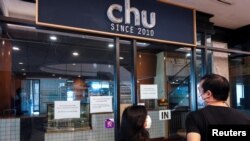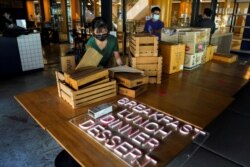It is one of the dining capitals of the world, but Bangkok’s foodie reputation is now hanging by a thread as the coronavirus devastates the city’s restaurant scene - the damage seen in for sale signs on the street and desperate Facebook posts from chefs lamenting closures.
Bo.lan, Chu and Soul Food Mahanakorn are city favorites all wiped out by a virus which bit deep into restaurant revenue during the first lockdown in April 2020, but 15 months later has killed off the businesses, which struggled through relentless restrictions on the hospitality industry.
On June 27, the Thai government banned all indoor dining in Bangkok and surrounding provinces, in a bid to stamp out the gravest round of the virus, which has left more than 2,000 dead and infected around 230,000 others since April.
Just one week before, restaurants celebrated after being told they could extend opening hours until 11p.m. local time - although a months-long alcohol ban was still formally in place.
“First to be shot, last to be tended to,” Michelin-recognized chef Chalee Kader of 100 Mahaseth restaurant posted on Facebook in early May, referring to the instant damage of restrictions to the food and beverage sector - which has received little state aid amid the pandemic. A Michelin ranking refers to the rating given a restaurant on quality.
“The service industry does not deserve to be left to bleed to death like this. We need help, REAL HELP, and we need it now.”
The impassioned plea has echoed across an Asian city defined by its food, from roof-top fine dining to Michelin-starred crab omelettes dished out at street side stalls.
Across the country, 50,000 establishments were already in deep trouble before the latest round of restrictions took a toll on the economy in April, according to the Thai Restaurant Association.
For Chirayu Na Ranong, chef and owner of downtown brunch spot Chu, the pileup of rent, the absence of customers and lack of government help meant closure of his flagship branch in the Asoke section of Bangkok.
“What could have saved my business is if the government had taken some responsibility during any of these lockdowns?” he said while speaking with VOA News.
The food scene faces major changes, owners say, with big chains poised to pick up stricken businesses in prime locations and hollow out Bangkok's eclectic and affordable mid-range restaurants.
“I think more businesses like ours will look to downsize and definitely move out of the big complexes with high rents,” Chirayu added.
Last supper?
Restaurant owners have heaped scorn on the government of Prime Minister Prayuth Chan-O-Cha for failing to float a lucrative hospitality sector through the pandemic despite it accounting for around 20 percent of Thai GDP and providing hundreds of thousands of jobs across the country.
“We are pretty much left to fend for ourselves,” said Noomie Tiwutanond, co-owner of Bitterman in Bangkok’s Silom neighborhood.
“You can’t plan your business… every time you open back up, you run your expenses, whether it’s cost of goods, overhead expenses, rent. But you’re never given enough time to recover.”
Under a barrage of complaints, the government last week set aside the equivalent of $235 million to help ease the impact of the latest restrictions in place until at least the end of July.
Staff will be compensated up to $233 for one month, while owners will receive about $90 per employee over the period.
Because they are limited to take-out with no alcohol sales, which account for one-third of revenue, restaurants are facing oblivion.
Prayuth’s government has been accused of doing too little too late.
“If you can’t do your job then get out because real people and real lives are affected here” Noomie added.
For U.S. state of Pennsylvania-born Jarrett Wrisley, owner of Soul Food Mahanakorn, which has closed, the halcyon days of a city that pulled talented chefs making high quality, affordable food have been brought to a brutal end by the new restrictions.
“There’s been no economic stimulus package for restaurants. There has been no rent relief; they haven’t given any debt relief,” he told VOA.
“At the top of a political chain in Thailand, it’s extremely chaotic,” Wrisley added.





